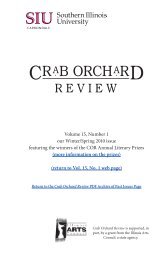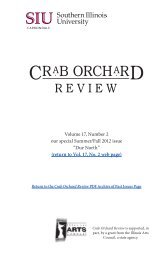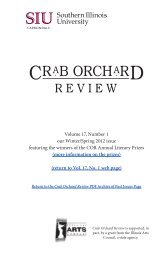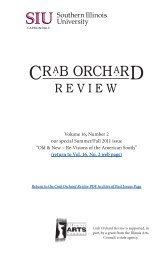Crab Orchard Review Vol. 12, No. 2, our
Crab Orchard Review Vol. 12, No. 2, our
Crab Orchard Review Vol. 12, No. 2, our
You also want an ePaper? Increase the reach of your titles
YUMPU automatically turns print PDFs into web optimized ePapers that Google loves.
202 ◆ <strong>Crab</strong> <strong>Orchard</strong> <strong>Review</strong><br />
Jeremy B. Jones<br />
They even critique other evangelical churches and speak about the<br />
opportunity to create a better church. A better denomination. A<br />
righteous church. This is an intensely American idea—the search for<br />
the new, pure church. America has more denominations than it can<br />
count, and they’re almost all sending missionaries to Latin America.<br />
As a Protestant Christian, I am a little offended by many of<br />
these forming churches, by their aggression toward Catholicism.<br />
This isn’t my country, but often it is my countrymen bringing such<br />
a message/tactic. Usually American missionaries bring the word.<br />
They start the churches—usually in someone’s house, and when more<br />
money is raised they seek a building. Then more money for guitars<br />
and amps and speakers. There are two wealthy churches in town, and<br />
they are loud. They are so loud that the people within a block are<br />
able to experience the service without even going. There is a young<br />
American missionary named Marshall living in a small community<br />
higher in the mountains. He comes into town every week or so to<br />
check his email. He’s growing a beard, I’ve noticed. Last week he<br />
had a conversation about salvation with the twenty-something-yearold<br />
guys that run the internet café. They seemed mostly interested,<br />
considering Marshall’s Spanish is elementary at best. He tended to<br />
say the same things over and over, and eventually the internet guys<br />
asked if he thought the world would end soon. He did.<br />
I’ve never had a conversation with Marshall. I don’t know<br />
why. Partly I am resistant to him as another American in town. It’s<br />
irrational, but I feel like he is infringing on my campo. Once we were<br />
both in the post office, and he, in Spanish, told me to have a good day.<br />
I could never pass for Latino, and he knows that I am American. Why<br />
didn’t he just address me in English? Maybe he thinks he’ll pass for<br />
Honduran. It’s clear that this isn’t his country (or his language), but I<br />
am curious about his motivations. Part of me wants to sit down with<br />
Marshall. I studied theology in college, and I am interested in his<br />
story.<br />
At the same time, I am offended by the manner in which he has<br />
come to Honduras. He has come to change it. He has come to meddle<br />
in what isn’t his. Of c<strong>our</strong>se, I have too. I am here to teach students; I am<br />
trying to spread education; I think I have something of use to give. It’s<br />
all so bothersome on a psychological level. In some way, it seems that<br />
any form of help is condescension—a reaching down. I have been very<br />
conscious of this since I came. I try to lend a hand rather than giving<br />
one. I have tried to be a part rather than an international influence. I






